Turmeric In The Modern World
TURMERIC IN THE MODERN WORLD (ISSUE 139)
By Diane Gold
TURMERIC, THAT ORANGE MEDICINAL ROOT
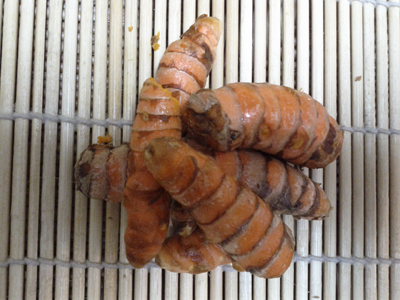 Turmeric benefits have been known in India for thousands of years. This spice has been used by many tribes, throughout many cultures with a myriad of applications. It spread from India to China to the East Indies (it’s naturalized in Jamaica now), to Polynesia, Hawaii, East Africa, West Africa and is a staple in many kitchens and medicine chests.
Turmeric benefits have been known in India for thousands of years. This spice has been used by many tribes, throughout many cultures with a myriad of applications. It spread from India to China to the East Indies (it’s naturalized in Jamaica now), to Polynesia, Hawaii, East Africa, West Africa and is a staple in many kitchens and medicine chests.
TURMERIC BENEFITS IN THE MODERN WORLD
Turmeric is not the only healing spice, but it does have superior applications. It is generally known as an anti-inflammatory, aiding with pain in the joints.
According to a 6-month study of 226 subjects, a double-blind, placebo-controlled clinical trial in Thailand, published Nov., 2013, in the Journal Of Nutritional Biochemistry; subjects in the non-placebo group reduced body weight, glucose and bad cholesterol (LDL-C) while increasing good cholesterol (HDL-C). The improvement was slight, but it was an improvement. Also, ALT levels lowered, indicating improved liver function.
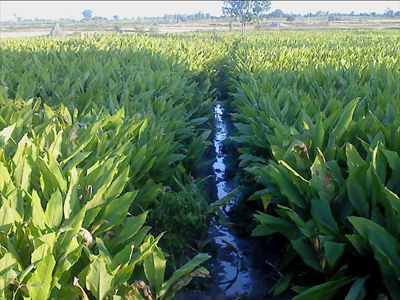 In the abstract of the study reported in Journal Of Nutritional Biochemistry, it states that this 6-month use of turmeric showed an increase in adiponectin levels increased and a decrease in leptin levels. These hormones, in the reported measures, are distinctly connected with lowered appetite, indicating a possible reason for lowered weight with the use of turmeric in Type 2 diabetics.
In the abstract of the study reported in Journal Of Nutritional Biochemistry, it states that this 6-month use of turmeric showed an increase in adiponectin levels increased and a decrease in leptin levels. These hormones, in the reported measures, are distinctly connected with lowered appetite, indicating a possible reason for lowered weight with the use of turmeric in Type 2 diabetics.
Also published in Journal Of Nutritional Biochemistry, January 5, 2012, is a study that shows where curcumin, the main ingredient in turmeric, protects against thioacetamide-induced hepatic fibrosis (liver scarring). The administration of curcumin to mice, in the study, induced apoptosis (cell death) in the damaged liver cells, probably due to curcumin’s ability to suppress inflammation.
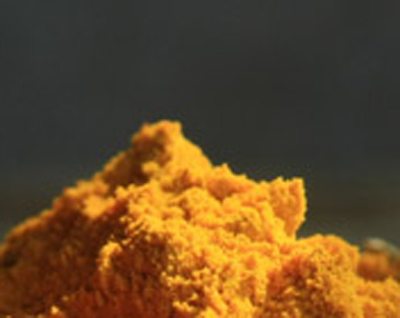 Turmeric, or its main ingredient, curcumin, may positively affect brain function in Alzheimer’s patients. The NIH abstract from a study published in Annals of Indian Academy Of Neurology, Jan-Mar, 2008, (ncbi.nlm.nih.gov/pmc/articles/PMC2781139) says,
Turmeric, or its main ingredient, curcumin, may positively affect brain function in Alzheimer’s patients. The NIH abstract from a study published in Annals of Indian Academy Of Neurology, Jan-Mar, 2008, (ncbi.nlm.nih.gov/pmc/articles/PMC2781139) says,
“…oxidative stress, free radicals, beta amyloid, cerebral deregulation caused by bio-metal toxicity and abnormal inflammatory reactions contribute to the key event in Alzheimer’s disease pathology. Due to various effects of curcumin, such as decreased Beta-amyloid plaques, delayed degradation of neurons, metal-chelation, anti-inflammatory, antioxidant and decreased microglia formation, the overall memory in patients with AD has improved.”
This is a huge statement and deserves tremendous attention.
In an almost insignificant study (except for the 3 people in it), published in Vol. 33, Issue 4, of Ayu, a quarterly journal on Ayurvedic Medicine, 3 Alzheimer’s patients improved their behavioral and psychological symptoms after taking 3 months of 763 mg of turmeric powder daily in pill form. Each could recognize her/his family after one year, although there is no concrete proof that this phenomenon was caused by the turmeric.
There are many studies that show this type of immune response on cancer cells, others that focus on digestive improvements, anti-oxidant qualities, National Institutes of Health, (nih.gov) states that turmeric can cause slow clotting of blood, but much research is still needed with larger human subject populations.
TURMERIC AND PATENTING IT
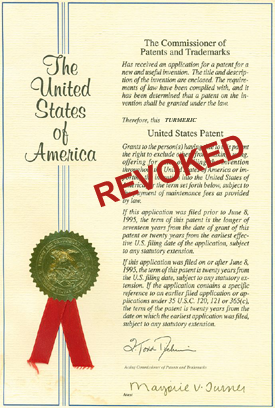 Very important for turmeric’s survival as a NON-PHARMACEUTICAL substance, is the United States patent that was given to University of Mississippi in 1995 for wound healing that, in 1997, due to a piracy complaint by The Council for Industrial Research stating that turmeric had been in use for thousands of years in India, was REVOKED.
Very important for turmeric’s survival as a NON-PHARMACEUTICAL substance, is the United States patent that was given to University of Mississippi in 1995 for wound healing that, in 1997, due to a piracy complaint by The Council for Industrial Research stating that turmeric had been in use for thousands of years in India, was REVOKED.
According to a simple interpretation of Diamond vs. Chakrabarty, 447 U.S. 303 (1980) (caselaw.lp.findlaw.com/scripts/getcase.pl?court=US&vol=447&invol=303), the Supreme Court ruling,
“Living things are not patentable subject matter under 101,”
although this is not a complete statement. According to the Patent Website, at uspto.gov/web/offices/pac/mpep/s2105.html, Section 101, referred to in the quote, speaks about human intervention as the clear indicator of whether a living thing is patentable.
It would seem how very liberal the language actually is and how easy it would be for a brilliant pharmaceutical attorney to create a patentable circumstance for any living thing, based upon language. Scary.
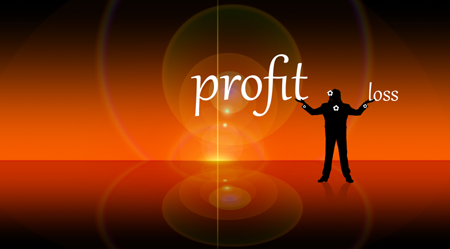 The only way a drug company would output the median amount per drug development, $350 million (according to Forbes’ Aug. 11, 2013, article citing Innothink Center For Research In Biomedical Innovation with the statistic) for a substance to be approved by the FDA (Food And Drug Administration) to market would be if the outcoming drug were patentable.
The only way a drug company would output the median amount per drug development, $350 million (according to Forbes’ Aug. 11, 2013, article citing Innothink Center For Research In Biomedical Innovation with the statistic) for a substance to be approved by the FDA (Food And Drug Administration) to market would be if the outcoming drug were patentable.
This drug or substance would have to go through multi-phased clinical trials and rigorous company work which often ends up costing $802 million (statistic at nih.gov) up to $5 billion (forbes.com, August 11, 2013). Only if a company can make lots of money after the clinical trial is over to recover the research money spent to develop the drug will a company go ahead.
Since turmeric is currently available as a naturally occurring substance and shown not to be patentable, it’s not being developed for prescription. Therefore, the big drug companies don’t study turmeric for all its benefits (and its main ingredient, curcumin) because huge profit after the expensive study would only be possible if the formulation carried a high price tag, only possible with patentability.
CONCLUSION
Let’s get those turmeric benefits. There are so many applications for healing and in food. Since I am not a cook, although I am acquiring limited cooking and rawing skills, there are many wonderful places turmeric belongs in food. When using it from the raw ingredient, as always, we get the most nutrient for our effort. It’s no wonder that its introduction was welcomed in so many places throughout the world. from India to China to East Indies (it’s naturalized in Jamaica) to Polynesia, Hawaii, East Africa, West Africa.
Organic turmeric has no pesticides, however, the soil where much turmeric is grown may still contain lead. It can come from industrial emissions, auto emissions (if you’re in Algeria (phaseout by 2014), Iraq (phaseout by 2015), Myanmar, North Korea, Yemen that still allow lead gas), plumbing pipes, paint. Just be aware of the possibility of lead, and eat some cilantro paste for a week to clear it out.
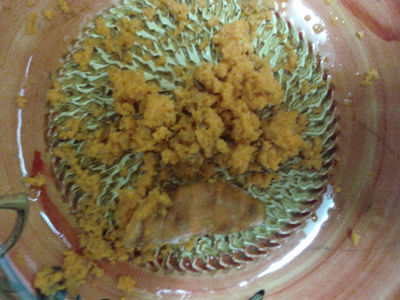 All in all, turmeric is great. I eat it every day. It’s one of the few veggies I eat that I will buy even if it’s not organic – because turmeric is good for me and even though, in 2008, the Hungarian Food Safety Office reported a crop of Thai turmeric to contain over 10 times their acceptable level of the pesticides methomyl and thiobicarb.
All in all, turmeric is great. I eat it every day. It’s one of the few veggies I eat that I will buy even if it’s not organic – because turmeric is good for me and even though, in 2008, the Hungarian Food Safety Office reported a crop of Thai turmeric to contain over 10 times their acceptable level of the pesticides methomyl and thiobicarb.
I’m always on the lookout for organic, so I can grate my turmeric and put it in my hemp protein breakfast. I’m certain the turmeric may be acting as an anti-fungal, anti-inflammatory, anti-oxidant, anti-cancer substance in my body. It’s certainly good for my mind to think so, anyway, especially with all those small, but promising, studies available, past and present.
ACTION STEPS
1) Get some organic turmeric, grate about 1/2 an inch, and put it in a smoothie. Enjoy.
2) Find a cool recipe that includes turmeric, and make it.
3) Notice whether you have mercury in your teeth, work around lead or whether your soil has lead in it. If you don’t have lead in the soil, plant a seed of something to eat. If you do, grow something to eat in an inside terrarium.
That’s it. Now, be healthy, you are already spiritually wealthy and be wiser than you were a moment ago.
![]()
If you wish to share your story, please hit reply in your email program to be contacted.
![]()
FEEDBACK
We value your feedback very much.
Please leave a comment below.
Please LIKE us on the website
and at WarriorsOfWeight on Facebook.
You can also follow us on
Twitter @warriorsoweight.
Thanks.
![]()
DIANE GOLD, PUBLISHER AND AUTHOR
Diane Gold, Founder of Warriors of Weight, Turning Habits Into Health, is a mentor in tai chi, kung fu and meditation, a music, fitness and stress expert, dedicated mom, studying plant-based nutrition, conflict resolution and habit change.
She believes that she is learning more about nutrition on a daily basis. She says,
“It is such a privilege to be researching the food I eat and to be able to eat the food I eat. I find out how polluted are so many food items that I hadn’t considered: lead in farm soil, heavy metals in salt, we never know when our turmeric is tested for lead, even the organic kind.
“I have gone over lots of material that shows great benefits from turmeric. I am certain it is one of the reasons I am feeling strong, and it’s probably giving me a daily detox which lead me to work more efficiently on peaceful conflict resolution.
“Thank you to everyone for giving me a reason to do this research. It’s fascinating, and the food is just mahvelous!
“Finally, let us all take good care of ourselves because we are so worth it!”
![]()







